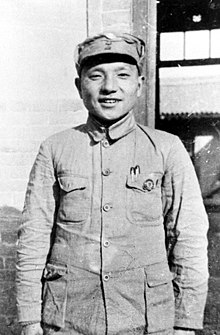Deng Xiaoping

Deng Xiaoping (listen Pronounced approximately "dehng shyau-ping"; August 22, 1904 – February 19, 1997) was a prominent Chinese politician and reformer, and the late leader of the Communist Party of China (CPC). Deng never held office as the head of state or the head of government, but served as the de facto leader of the People's Republic of China from 1978 to the early 1990s. He developed "Socialism with Chinese characteristics" and Chinese economic reform, also known as the "socialist market economy", and opened China to the global market. During his paramount leadership, his official state positions were Chairman of the National Committee of the Chinese People's Political Consultative Conference from 1978–1983 and Chairman of the Central Military Commission of the People's Republic of China from 1983–1990, while his official party positions were Vice Chairman of the Communist Party of China from 1977–1982 and Chairman of the Central Military Commission of the Communist Party of China from 1981–1989.
| This article about a political figure is a stub. You can help Wikiquote by expanding it. |
Quotes
- It doesn't matter whether the cat is black or white, as long as it catches mice.
- Quoted in Hung Li China's Political Situation and the Power Struggle in Peking (1977), p. 107
- According to Chambers Dictionary of Quotations (1993), p. 315, this quote is from a speech at the Communist Youth League conference in July 1962.
- The United States brags about its political system, but the [American] President says one thing during the election, something else when he takes office, something else at midterm and something else when he leaves.
- When asked about China's political stability by a group of American professors in 1983, as quoted in The Pacific Rim and the Western World: Strategic, Economic, and Cultural Perspectives (1987), p. 105
- A basic contradiction between socialism and the market economy does not exist.
- As quoted in Daily report: People's Republic of China, Editions 240-249 (1993), p. 30
- Variant: There are no fundamental contradictions between a socialist system and a market economy.
- Interview, Time, 4 November 1985.
- When our thousands of Chinese students abroad return home, you will see how China will transform itself.
- As quoted in Forbes, Vol. 176, Editions 7-13 (2005), p. 79
- We mustn't fear to adopt the advanced management methods applied in capitalist countries (...) The very essence of socialism is the liberation and development of the productive systems (...) Socialism and market economy are not incompatible (...) We should be concerned about right-wing deviations, but most of all, we must be concerned about left-wing deviations.
- Cited by António Caeiro in Pela China Dentro (translated), Dom Quixote, Lisboa, 2004. ISBN 972-20-2696-8
- ”If you open a window for fresh air, you have to expect some flies to blow in.”
- » Great Firewall of China Torfox. cs.stanford.edu.
Misattributed or apocryphal
- 致富光荣 (zhìfù guāngróng: To get rich is glorious!)
- Deng is commonly quoted with this phrase in western media but there is no proof that he actually said it
- However, this phrase in Chinese is more accurately translated as "wealth is glorious," where wealth can have a very general meaning, including knowledge, personal relationships, family: anything of value. Understood this way, the quote is not as directly controversial as a ideological/political statement, and so it is not hard to believe that he really did say this.[1]
- One Country, Two systems.
- Actually coined by Mao Zedong, popularized by Deng Xiaoping
- Let some people get rich first.
- "Nanxun" (Southern Tour) of 1992. Quoted in The Economist (31 May 2001). A summarization of several quotations from Deng Xiaoping, known in Chinese as, "让一部分人先富起来", News of the Communist Party of China World Development Report 2009 The Nanxun Legacy and China's Development in the Post-Deng Era.
- Seek Truth from Facts
- Actually from the Han Shu 《漢書·河間獻王劉德傳》, not coined by Mao Zedong nor by Deng Xiaoping, popularized by various people before them.
External links
- ↑ [1]
- ↑ Henry He, Dictionary of the Political Thought of the People's Republic of China, Routledge, 2016, ISBN 978-1-31550044-7, p. 287
- ↑ Evan Osnos, Boom Doctor, New Yorker, October 11, 2010:
The strategy, as Chen Yun put it, was “crossing the river by feeling for the stones.” (Deng, inevitably, received credit for the expression.) - ↑ Chinese land reform: A world to turn upside down, The Economist, 2013 October 31
Liu Hongzhi, who oversees the scheme, quotes a famous phrase often attributed to Deng, though in fact coined by a colleague: “We are crossing the river by feeling the stones.”
